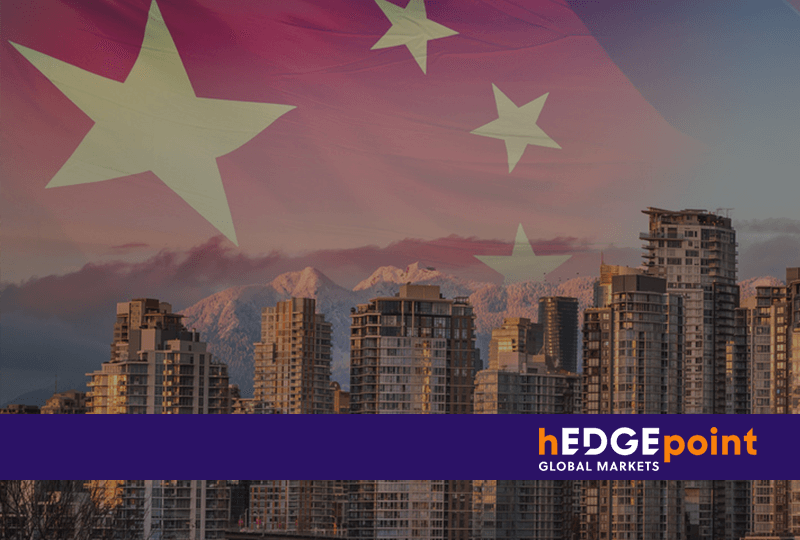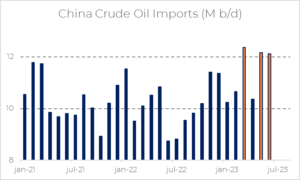
The Chinese real estate sector is extremely important for both local and global macroeconomics, representing around 30% of China’s GDP (Gross Domestic Prod

The Chinese real estate sector is extremely important for both local and global macroeconomics, representing around 30% of China’s GDP (Gross Domestic Product). Just for you to have an idea: it’s an area that represents approximately one-third of the nation’s economic production.
The global market had high expectations for the economic reopening of China and the end of its “COVID Zero” policy. However, since these happened, the country’s economy hasn’t been growing at the expected pace.
In this article, we’re going to talk about the main aspects that have led the Chinese nation to its real estate sector crisis and what the possible effects are for global commodity chains. We’ve invited Alef Dias and Victor Arduin, Market Intelligence Analysts at hEDGEpoint Global Markets, to talk about this critical subject.
Continue reading and find out!
In 1998, China underwent a real estate reform, leading to a rapidly expanding market. Over the past 20 years, the real estate sector has benefited from ample credit facilities to continue to grow at an accelerated rate.
In addition, the influence of cultural factors can clearly be seen, since one of the prerequisites for the Chinese to get married has traditionally been associated with buying a house. Families have also purchased properties as a source of investment income.
However, easy access to credit increased real estate speculation and the sector’s indebtedness. The consequences? Many companies began to face financing and indebtedness problems, raising distrust among consumers and investors. Added to a challenging demographic structure, this resulted in several projects being paralyzed in 2022, a year marked by a 24% drop in real estate sales.

Alef Dias, Market Intelligence Analyst
“The Chinese real estate market presents the problem of corporate debt, which has been happening with more intensity since 2021. The government isn’t granting more stimulus, as it wants to avoid financial speculation,” Dias explains.
In December of 2022, the Chinese government abruptly ended its policy called “COVID Zero” which consisted of applying strict quarantine measures, together with mass testing of the population. The rules included strict lockdowns, with shops, schools, and businesses all closed.
Last year, China had one of its worst growth rates in four decades, according to official data. Health restrictions led many people to avoid leisure activities, which in turn reduced consumption. Many factories and businesses also had to shut down.
hEDGEpoint experts point out that the economic reopening of China, after the end of the “COVID Zero” policy, hasn’t generated the expected economic growth, and this is also directly related to the crisis in the country’s real estate sector:

Victor Arduin, Market Intelligence Analyst
“An intense reopening was expected, but that’s not what happened. The Chinese market hasn’t warmed up enough with the current fiscal and monetary incentives,” Victor Arduin remarked.
The whole world is slowing down economically due to very high-interest rates, which causes consequences such as an increase in credit for individuals and companies, compromising the pace of economic activities. Thus, it becomes more expensive to borrow money to buy goods and services, which can reduce production and demand, slowing down the entire economy.
Higher-than-expected inflation, particularly in the U.S. and major European economies, is tightening global financial conditions. As a measure to face this context and stimulate the domestic market, China lowered its interest rates.
“China has lowered its interest rates very little. This signals the government’s concern about not causing market jitters and price speculation, but it’s having a limited impact on boosting demand for housing and investment,” Arduin continued.
When there’s an economic slowdown in Europe and the U.S., as we’re currently seeing, the Chinese industrial sector may suffer more direct consequences than the real estate sector itself, which already faces its own problems. According to Arduin, this happens because European countries, for example, will be able to import fewer goods from China, if their population returns to consuming less.
“Without Europe’s imports, China will produce less, slowing down sales, and consequently, its overall economy,” the specialist clarifies.
The Chinese reopening hasn’t had the impact expected, especially when we talk about the demand for commodities. This can be largely explained by the fact that the recovery has been concentrated in the services sector.
China provides the main demand for several commodities in the world, mainly grains and energy. When an economic recovery is forecast, the expectation of greater demand for these commodities also exists, especially in the case of energy, since people tend to leave their houses more. The markets expected this, but it hasn’t happened.
In a scenario of greater economic activity, the stimulus to produce goods that require commodity imports for their development is present. Alef Dias explains the correlation here:
“The real estate sector hasn’t achieved the same performance when compared to services. A practical example: the construction industry itself needs more tractors. Tractors consume fuel, and if there were more construction and thus heating of the real estate sector, it would lead to a probable increase in the demand for oil, for example.”
Victor Arduin points out that China’s slowdown in relation to demand for commodities is not homogeneous, as record oil imports were observed in March and May of this year.
“We’ve observed that the country has benefited from the war between Russia and Ukraine, taking advantage of Russian oil discounts, and improving the profit margin of its refined products,” Arduin adds.

Fonte: hEDGEpoint Global Markets
The prospect is for increased stimuli by the Chinese government. “We expect an increase in these incentives from the Chinese government, but it probably won’t be of the magnitude necessary to provide strong growth and compensate for all the slowdown we’re seeing in the West,” Alef comments.
hEDGEpoint analysis shows that the Chinese government is showing more favorability toward granting monetary stimuli. The problem is that interest rate cuts run the risk of being less efficient than fiscal stimulus, such as investments in new real estate sector projects.
According to analysts at Goldman Sachs, China is also likely to implement more easing measures in the second half which include:
However, the prospect is for a gradual and balanced recovery of the real estate market, avoiding overheating, as has happened in previous cycles.
hEDGEpoint continues to monitor all events that may affect the macroeconomy and have repercussions on commodity markets. Thus, we’re able to strategically offer risk management solutions to our clients.
Understanding all the factors that can impact commodities is vital to bring more security and protection to your business. Based on innovation, valuable insights, and market intelligence, hEDGEpoint provides essential hedging products to help you plan more effectively and make more assertive decisions.
Talk to a hEDGEpoint specialist today to learn more!

Rua Funchal, 418, 18º andar - Vila Olímpia São Paulo, SP, Brasil
Contato
(00) 99999-8888 example@mail.com
Section
Home
O que Fazemos
Mercado
Quem Somos
HUB
Blog
Esta página foi preparada pela Hedgepoint Schweiz AG e suas afiliadas (“Hedgepoint”) exclusivamente para fins informativos e instrutivos, sem o objetivo de estabelecer obrigações ou compromissos com terceiros, nem de promover uma oferta ou solicitação de oferta de venda ou compra de quaisquer valores mobiliários, commodity interests ou produtos de investimento.
A Hedgepoint e suas associadas renunciam expressamente a qualquer uso das informações contidas neste documento que direta ou indiretamente resulte em danos ou prejuízos de qualquer natureza. As informações são obtidas de fontes que acreditamos serem confiáveis, mas não garantimos a atualidade ou precisão dessas informações.
O trading de commodity interests, como futuros, opções e swaps, envolve um risco substancial de perda e pode não ser adequado para todos os investidores. Você deve considerar cuidadosamente se esse tipo de negociação é adequado para você, levando em conta sua situação financeira. O desempenho passado não é necessariamente indicativo de resultados futuros. Os clientes devem confiar em seu próprio julgamento independente e/ou consultores antes de realizar qualquer transação.
A Hedgepoint não fornece consultoria jurídica, tributária ou contábil, sendo de sua responsabilidade buscar essas orientações separadamente.
A Hedgepoint Schweiz AG está organizada, constituída e existente sob as leis da Suíça, é afiliada à ARIF, a Associação Romande des Intermédiaires Financiers, que é uma Organização de Autorregulação autorizada pela FINMA. A Hedgepoint Commodities LLC está organizada, constituída e existente sob as leis dos Estados Unidos, sendo autorizada e regulada pela Commodity Futures Trading Commission (CFTC) e é membro da National Futures Association (NFA), atuando como Introducing Broker e Commodity Trading Advisor. A Hedgepoint Global Markets Limited é regulada pela Dubai Financial Services Authority. O conteúdo é direcionado a Clientes Profissionais e não a Clientes de Varejo. A Hedgepoint Global Markets PTE. Ltd está organizada, constituída e existente sob as leis de Singapura, isenta de obter uma licença de serviços financeiros conforme o Segundo Anexo do Securities and Futures (Licensing and Conduct of Business) Act, pela Monetary Authority of Singapore (MAS). A Hedgepoint Global Markets DTVM Ltda. é autorizada e regulada no Brasil pelo Banco Central do Brasil (BCB) e pela Comissão de Valores Mobiliários (CVM). A Hedgepoint Serviços Ltda. está organizada, constituída e existente sob as leis do Brasil. A Hedgepoint Global Markets S.A. está organizada, constituída e existente sob as leis do Uruguai.
Em caso de dúvidas não resolvidas no primeiro contato com o atendimento ao cliente (client.services@hedgepointglobal.com), entre em contato com o canal de ouvidoria interna (ombudsman@hedgepointglobal.com – global ou ouvidoria@hedgepointglobal.com – apenas Brasil) ou ligue para 0800-8788408 (apenas Brasil).
Integridade, ética e transparência são valores que guiam nossa cultura. Para fortalecer ainda mais nossas práticas, a Hedgepoint possui um canal de denúncias para colaboradores e terceiros via e-mail ethicline@hedgepointglobal.com ou pelo formulário Ethic Line – Hedgepoint Global Markets.
Nota de segurança: Todos os contatos com clientes e parceiros são realizados exclusivamente por meio do nosso domínio @hedgepointglobal.com. Não aceite informações, boletos, extratos ou solicitações de outros domínios e preste atenção especial a variações em letras ou grafias, pois podem indicar uma situação fraudulenta.
“Hedgepoint” e o logotipo “Hedgepoint” são marcas de uso exclusivo da Hedgepoint e/ou de suas afiliadas. O uso ou reprodução é proibido, a menos que expressamente autorizado pela HedgePoint.
Além disso, o uso de outras marcas neste documento foi autorizado apenas para fins de identificação. Isso, portanto, não implica quaisquer direitos da HedgePoint sobre essas marcas ou implica endosso, associação ou aprovação pelos proprietários dessas marcas com a Hedgepoint ou suas afiliadas.
aA Hedgepoint Global Markets é correspondente cambial do Ebury Banco de Câmbio, de acordo com a resolução CMN Nº 4.935, DE 29 DE JULHO DE 2021, Artigo 14 do Banco Central do Brasil (BACEN).
Para mais informações sobre nosso parceiro, serviços disponíveis, atendimento e ouvidoria, acesse o link a seguir: https://br.ebury.com/